

Did Cartagena mark the beginning of the end of the war on drugs? Dominated by Anglo/Latin discord and the improprieties of Barack Obama's entourage, the most recent Summit of Americas in the Colombian city of Cartagena appears at first glance to have been a waste of jet fuel. But while lurid tales of secret service agents behaving like hirelings on a piss-up tour make for tasty headlines, the summit could well be remembered not for its failures, but as the beginning of the end of the war on drugs.
The significance of what transpired over the weekend cannot be overstated: in years past, we've seen countless instances of former leaders, judges and law enforcement officers coming forward to argue the case for international drug policy reform, but this is the first time we've seen sitting governments openly discussing ending the war on drugs in a diplomatic setting. What these kernels of reason suggest is that even for ideologues, the topic of reform has become unavoidable and that the political currency of polarisation is officially bankrupt.
The Monster and Monterrey: The Politics and Cartels of Mexico's Drug War. Drug-Law Reform Genie Freed From Bottle at Summit of the Americas. Presidents Obama and Juan Manuel Santos at Cartagena.
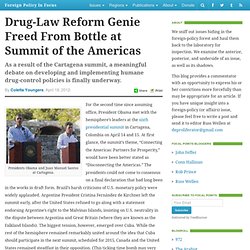
For the second time since assuming office, President Obama met with the hemisphere’s leaders at the sixth presidential summit in Cartagena, Colombia on April 14 and 15. At first glance, the summit’s theme, “Connecting the Americas: Partners for Prosperity,” would have been better stated as “Disconnecting the Americas.” The presidents could not come to consensus on a final declaration that had long been in the works in draft form. Brazil’s harsh criticisms of U.S. monetary policy were widely applauded. Argentine President Cristina Fernández de Kirchner left the summit early, after the United States refused to go along with a statement endorsing Argentine’s right to the Malvinas Islands, insisting on U.S. neutrality in the dispute between Argentina and Great Britain (where they are known as the Falkland Islands).
Yet what was refreshing about the Cartagena meeting was that these differences were aired in public. The Summit of the Americas, WikiLeaks and the failed war on drugs. New York, NY - Back in the 1990s, when many Latin American governments were aligned with Washington's wider political and economic goals in the hemisphere, the so-called "Summits of the Americas" rarely displayed any contentious fireworks.
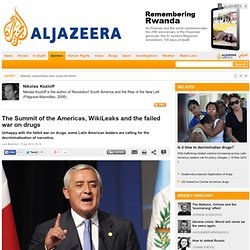
Yet times have changed and this year's summit, to be held in Cartagena, Colombia, could prove to be highly combustible. Unhappy with the Obama administration's failed war on drugs, which has led to widespread violence and endemic corruption, some Latin American leaders are bluntly calling for the decriminalisation of narcotics. U.S. Faces Challenge to "Drug War" as Latin American Countries Mull Decriminalization, Legalization. This is a rush transcript.
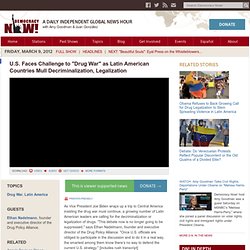
Copy may not be in its final form. JUAN GONZALEZ: U.S. An End to the War on Drugs? by Alma Guillermoprieto. As a normally pro-forma gathering of hemispheric leaders gets under way in Cartagena, Colombia, this weekend, Latin America could instead be approaching its declaration of independence from the United States.
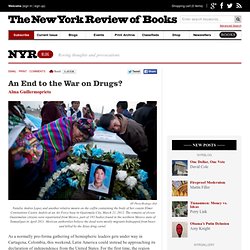
For the first time, the region might come out against a US policy. The change in what seemed to be an immovable subservience has come gradually, but the immediate cause is drugs, and the surprising agent is Otto Pérez Molina, retired general, former intelligence chief, graduate of the Pentagon’s School of Americas, and now the new president of Guatemala. Pérez Molina is no stranger to the War on Drugs. He campaigned for president promising to bring out the country’s dreaded Kaibil Army special forces against the drug trade; Guatemalan voters, judging crime and insecurity to be their greatest concern, elected him in November.
Latin America - History / Political Economy. Drug Policy. Stop Arms Trafficking More Information. Did Cartagena mark the beginning of the end of the war on drugs? Drug-Law Reform Genie Freed From Bottle at Summit of the Americas. An End to the War on Drugs? by Alma Guillermoprieto. The Summit of the Americas, WikiLeaks and the failed war on drugs. We have to find new solutions to Latin America's drugs nightmare. Twenty years ago, I became head of intelligence services in the Guatemalan army.
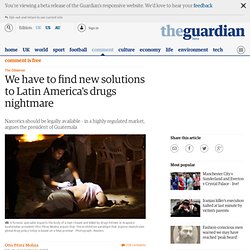
In this capacity, I had to co-ordinate operations with several United States and Latin American agencies dealing with the fight against drug trafficking. In those years, this was already a challenging and complex task. However, Guatemala's security forces had the capacity to deal with the problem, intercepting drug convoys and arresting drug lords. Probably the most important victory on this front was our sophisticated and discreet intelligence operation that led to the arrest of a prominent Mexican drug lord, who was subsequently sent to Mexico for trial. None the less, the drug lord stayed in jail only eight years, managing to escape from a high-security prison, something that in itself shows the corrupting tentacles of drug trafficking.
Three months ago, I became president of Guatemala. And facts are what we need to concentrate on when considering drug policy options. Should Central America Legalize Drugs? - Ralph Espach - International. Some regional leaders say it could bring peace and much-needed tax revenue, but both they and supporters of the drug war are missing the real problem.

Girls walk past a soldier on patrol in Guatemala / AP. Colombia and Mexico push for drugs debate. "Beating the Drug-War Addiction" by Juan Gabriel Tokatlian. Exit from comment view mode. Click to hide this space BUENOS AIRES – In January, US President Barack Obama nominated Marine Corps Lieutenant General John F. Kelly to head the United States Southern Command (USSOUTHCOM). Biden to Latin America: Drop Dead - By Peter Passell. The real headline in The New York Times was more measured: "U.S.
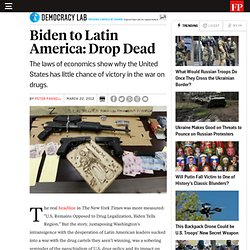
Remains Opposed to Drug Legalization, Biden Tells Region. " But the story, juxtaposing Washington's intransigence with the desperation of Latin American leaders sucked into a war with the drug cartels they aren't winning, was a sobering reminder of the parochialism of U.S. drug policy and its impact on other countries. Vice President Joe Biden, who did manage to couch his brush-off of Latin American concerns in diplomatic language, is certainly right that legalization would be no panacea. Declaracao_ingles_site. The U.S. War for Drugs of Terror in Colombia. I just had the pleasure of reading an important new book entitled, Cocaine, Death Squads and the War on Terror: U.S.
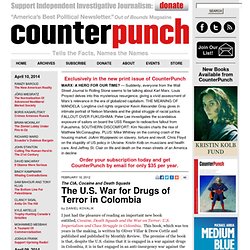
Imperialism and Class Struggle in Colombia. This book, which was ten years in the making, is written by Oliver Villar & Drew Cottle and published and published by Monthly Review. The premise of the book is that, despite the U.S. claims that it is engaged in a war against drugs in Colombia, it is in fact engaged in an anti-insurgency war against the left-wing FARC guerillas – a war which does not seek to eradicate coca growing and cocaine production in Colombia at all. Rather, the U.S. war effort (which has cost U.S. taxpayers over $7 billion since 2000) is designed to ensure that the allies of the U.S. in Colombia — that is, the Colombian state, paramilitaries and wealthy elite who are favorable to U.S. business interests and to the U.S.’s desire for exploitation of Colombia’s vast resources — are themselves able to monopolize the drug trade so critical to their survival.
Cocaine, Death Squads and the War on Terror.